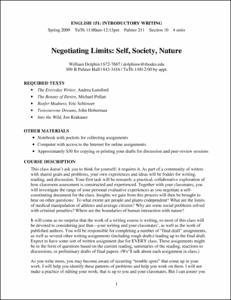Please use this identifier to cite or link to this item:
http://hdl.handle.net/10267/3472Full metadata record
| DC Field | Value | Language |
|---|---|---|
| dc.contributor.author | Dolphin, William | - |
| dc.date.accessioned | 2009-02-20T17:10:22Z | - |
| dc.date.available | 2009-02-20T17:10:22Z | - |
| dc.date.issued | 2009-01-14 | - |
| dc.identifier.uri | http://hdl.handle.net/10267/3472 | - |
| dc.description | This syllabus was submitted to the Office of Academic Affairs by the course instructor. | en_US |
| dc.description.abstract | This class doesn’t ask you to think for yourself; it requires it. As part of a community of writers with shared goals and problems, your own experiences and ideas will be fodder for writing, reading, and discussion. Your first task will be research: a practical, collaborative exploration of how classroom assessment is constructed and experienced. Together with your classmates, you will investigate the range of your personal evaluative experiences as you negotiate a selfconstituting document for the class. Insights we gain from this process will then be brought to bear on other questions: To what extent are people and plants codependent? What are the limits of medical manipulation of athletes and average citizens? Why are some social problems solved with criminal penalties? Where are the boundaries of human interaction with nature? It will come as no surprise that the work of a writing course is writing, so most of this class will be devoted to considering just that—your writing and your classmates’, as well as the work of published authors. You will be responsible for completing a number of “final draft” assignments, as well as several other writing assignments (including rough drafts) leading up to the final draft. Expect to have some sort of written assignment due for EVERY class. These assignments might be in the form of questions based on the current reading, summaries of the reading, reactions to discussions, or preliminary drafts of final papers. (We’ll talk about each assignment in class.) As you write more, you may become aware of recurring “trouble spots” that come up in your work. I will help you identify these patterns of problems and help you work on them. I will not make a practice of editing your work; that is up to you and your classmates. But I can assure you that you won’t get it right the first time, the second time, or possibly even the tenth time. Like many human activities, writing rewards practice. | en_US |
| dc.language.iso | en_US | en_US |
| dc.publisher | Memphis, Tenn. : Rhodes College | en_US |
| dc.relation.ispartofseries | Syllabi CRN | - |
| dc.relation.ispartofseries | 29221 | - |
| dc.rights | Rhodes College owns the rights to the digital objects in this collection. Objects are made available for educational use only and may not be used for any non-educational or commercial purpose. Approved educational uses include private research and scholarship, teaching, and student projects. For additional information please contact archives@rhodes.edu. Fees may apply. | - |
| dc.subject | English, Department of | en_US |
| dc.subject | Syllabus | en_US |
| dc.subject | Curriculum | en_US |
| dc.subject | Academic departments | en_US |
| dc.subject | Text | en_US |
| dc.subject | 2009 Spring | en_US |
| dc.title | ENGL 151-10, Negotiating Limits: Self, Society, Nature, Spring 2009 | en_US |
| dc.type | Syllabus | en_US |
| Appears in Collections: | Course Syllabi | |
Files in This Item:
| File | Description | Size | Format | |
|---|---|---|---|---|
| 2009_SP_ENGL_151_10_29221.pdf | 18.6 kB | Adobe PDF |  View/Open |
Items in DSpace are protected by copyright, with all rights reserved, unless otherwise indicated.